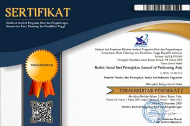City Branding Ambon City Of Music Sebagai Folk Identity Music Di Maluku
Abstract
The article of city branding on Ambon City of Music discusses the legalisation of folk music identity in Maluku. By using the qualitative research method with a case study approach. Data obtained were primary data in the field, and the secondary data were obtained from various media. Data was collected by doing direct interviews and essential documents. Ambon City of Music is an iconic branding that becomes the identity for the people of Maluku. The people of Maluku have music DNA so that it is worth mentioning as a City of Music. It can be seen through the selection of Ambon city as a City of Music by UNESCO in October 2019. Ambon City has become a new identity to introduce the musical culture of the Maluku people. Music is used as social capital in creating peace, while the acculturation of the folk music genre is a symbol of community identity in Maluku. The author argues that the branding of Ambon City of Music itself elevates the dignity of folk music identity. The people of Maluku are known as having the highly musical skills, singing, and experts in playing traditional instruments, such as tifa, totobuang, bamboo flute, tahuri, etc. The recognition by UNESCO strengthens the musical identity of the people of Maluku in the world. Ambon city branding is a legitimation of Maluku folk identity in music and singing and a city of peace because of the music, with the result of the people of Maluku collectively having an awareness of primordial relations.
Keywords
Full Text:
PDFReferences
Bibliography
Kavaratzis Mihalis & G.J.Ashworth. (2007). Partners in coffeeshops, canals and commerce: Marketing the city of Amsterdam. Cities, 16-25. doi:https://doi.org/10.1016/j.cities.2006.08.007
akbar, H. u. (2008). Metodologi Penelitian Sosial. Jakarta: Bumi Aksara.
Anholt, S. (2006). Competitive Identity: The New Brand Management for Nations, Cities and Regions. London: Palgrave Macmillan.
Bele, A. (2011). “Nurani orang Buna”: spiritual capital dalam pembangunan. Salatiga: Disertasi, Doktor Studi Pembangunan Universitas Kristen Satya Wacana.
Bourdieu, P. (2012). Arena Produksi Kultural: Sebuah Kajian Sosiologi Budaya. Kasihan, Bantul: Kreasi Wacana.
Creswell, J. W. (2010). Research Design: Pendekatan kualitatif, Kuantitatif dan mixed. Yogyakarta: Pustaka Pelajar.
Danandjaja, J. (1994). Folklore Indonesia, Ilmu Gossip, Dongeng dan lain-lain. Jakarta: Pustaka Utama Grafiti.
Dundes, A. (1965). The Study Of Folklore. New Jersey:: Prentice-Hall. Inc. Engelwood Cliffs, N. J,.
G.J.Ashworth, M. K. (2007). Partners in coffeeshops, canals and commerce: Marketing the city of Amsterdam. Cities, 16-25. doi:https://doi.org/10.1016/j.cities.2006.08.007
Kartajaya, H. (2005). Positioning, Differensiasi, Brand. Memenangkan Persaingan dengan segitiga Positioning, Differensiasi, Brand. Jakarta: Gramedia Pustaka Utama.
Keller, K. L. (2012). Strategic Brand Management: Building, Measuring, and Managing Brand Equity, 4th Edition. New Jersey: Prentice Hall.
Lefebvre, H. ( 1991). The Production of Space, . Oxford: Basil Blackwel.
M. Rahmat Yananda, U. S. (2014). Branding Tempat : Membangun Kota, Kabupaten, dan Provinsi Berbasis Identitas. Jakarta: Makna Informasi.
Murfianti, F. (2010, Juni). Membangun City Branding Melalui Solo Batik Carnival. Jurnal Penelitian Seni dan Budaya, 2(1), 14 – 20.
Noya, A. (2020). Program City Branding Ambon City of Music (Studi Evaluatif pada Dinas Pariwisata dan Kebudayaan Kota Ambon tahun 2011-2019). Yogyakarta: Universitas Gadja Mada.
Putnam, R. D. (2000). Bowling Alone: The Collapse in Revival of American Community. New York: Simon & Schuster.
Ruberu, M. (2017). “Dinamika Komunikasi Perumusan City Branding Yogyakarta Studi Kasus Perumusan City Brand Jogja Istimewa Oleh Pemerintah Provinsi DIY”. Tesis pada FISIPOL. Yogyakarta: Universitas Gadja Mada.
Salakory, R. P. Mb. (2020). Teong Negeri: Sentralitas Folklore Nama Lokal Komunitas Dalam Jejearing Sosio-kultural Islam Kristen Di Maluku. Salatiga: Tesis: Universitas Kristen Satya Wacana.
Stephens, M. C. (2005). Living Folklore, An Introduction to the Study of People and Their Traditions. Utah: Utah State University Press.
Suwitra, A. (2011). “Membangun Denpasar Melalui City Branding”. Denpasar: Bappeda.
DOI: https://doi.org/10.24821/resital.v21i3.4488
Refbacks
- There are currently no refbacks.
This work is licensed under a Creative Commons Attribution 4.0 International License.



